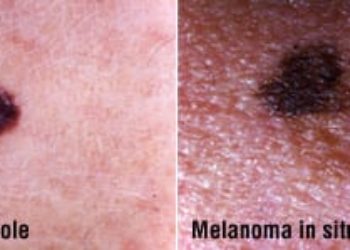Lower rates of self skin examination among ethnic minorities
Image: PD
1. Ethnic minorities were less likely than whites to self examine the skin or undergo a full body examination by a health care provider, but were just as likely to self examine the hands and feet.
Evidence Rating Level: 2 (Good)
Study Rundown: Acral lentiginous melanoma (ALM), which primarily affects the palms, soles, and nail beds, is an uncommon but particularly aggressive type of melanoma. Also, unlike other types which tend to afflict the fair skinned, ALM shows a predilection for darker skinned people such as African Americans, Hispanics, and Asians/Pacific Islanders. Notably, these ethnic groups also show more advanced disease at the time of diagnosis and poorer survival rates than in whites. The authors hypothesized that these ethnic disparities were due to lower rates of skin self examination among minorities. Surveying 1,040 patients, they found that whites undergo self skin examinations more frequently than do ethnic minorities, but there were no such differences in self examination of the hands and feet, where ALM tends to occur. The study is aided by a large sample size, but is limited by its focus on only one institution (where only 25% of patients were of a non-white ethnic group) and its reliance on patient recall.
Click to read the study in JAAD
Relevant reading: Is skin self-examination for cutaneous melanoma detection still adequate? A retrospective study
In-Depth [retrospective cohort]: Using a questionnaire, the authors at University of California, Los Angeles collected basic demographic information and data regarding skin examination practices from 1,040 patients who entered the waiting room of a dermatology clinic. The questionnaire did not undergo validation testing prior to administration. The results revealed that white patients performed self skin examinations of the body significantly more frequently than did ethnic minority patients (p < 0.01), but no statistically significant differences were found between rates of self hand (p = 0.7) or foot (p = 0.87) examination. In addition, more white patients had undergone a full-body skin examination from a health care provider than minority patients (p = 0.02), but again, there was no statistically significant difference between the rates of examination of the hands (p = 0.06) and feet (p = 0.59) by the health care provider. This data suggested that decreased skin examination, while not solely responsible for high rates of ALM in ethnic minorities, may play a role.
©2012-2014 2minutemedicine.com. All rights reserved. No works may be reproduced without expressed written consent from 2minutemedicine.com. Disclaimer: We present factual information directly from peer reviewed medical journals. No post should be construed as medical advice and is not intended as such by the authors, editors, staff or by 2minutemedicine.com. PLEASE SEE A HEALTHCARE PROVIDER IN YOUR AREA IF YOU SEEK MEDICAL ADVICE OF ANY SORT.


![2MM: AI Roundup- AI Cancer Test, Smarter Hospitals, Faster Drug Discovery, and Mental Health Tech [May 2nd, 2025]](https://www.2minutemedicine.com/wp-content/uploads/2025/05/Untitled-design-350x250.png)






